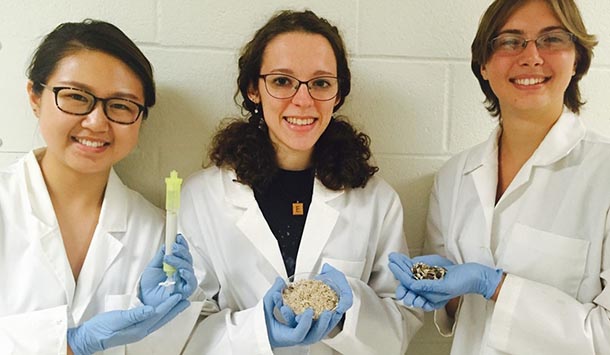
Boya Xiong, Emma Clement, and Bethany Piechowicz researched different components of the Moringa water filter to form a winning formula.
Winning theory may help developing nations
7/21/2017
Who would have thought that getting clean water from a miracle tree would be possible. Student engineering researchers are making this a reality. Emma Clement and Bethany Piechowicz conducted year-long research and arrived at the hypothesis that the Moringa oleifera tree otherwise known as the “miracle tree,” could provide clean water for many developing nations. As a result of the protein theory, this duo placed first in the 2017 Student Association of Environmental Science and Engineering (ECMSS) spring competition.
“It was a rewarding experience and I enjoyed the eagerness of everyone present who were curious about our research,” said Piechowicz.
As part of the research, the students were driven to prove their protein hypothesis. “This tree has a special protein that is positively charged and antimicrobial and could potentially have the means to a solution for the world’s drinking water crisis,” said Clement. Clement and Piechowicz were successful in testing and modeling the adsorption of this protein onto sand particles in a sand filter, providing clean water in a sustainable way.
This filter design was developed by their research adviser Dr. Stephanie Velegol, and the column can remove particles at the EPA standard. However, “we want to be able to model the removal so that we can apply the filter to other column designs in the field,” said Clement. “Currently, we have a clean bed filtration model that we believe may be working well but future work is needed to confirm our hypothesis.”
The winning solution was developed by the students through a mathematical model to see how long the filter lasts and how many bacteria and dirt particles the filter will remove in different circumstances. Undergraduate Ariel Wang joined the two students in this research to create a winning formula.
The ECMSS is an annual student run symposium held at Penn State’s University Park campus, which brings together graduate students, undergraduate students, and faculty members engaged in environmentally relevant research, according to the ECMSS website. Poster and oral presentations are given by the students and judged by Penn State faculty.
“Presenting our research to graduate students and faculty provided a way for me to apply the knowledge I’ve learned in my classes to a real world problem,” said Piechowicz.
MEDIA CONTACT:
Jane Horetsky
jeh94@engr.psu.edu



